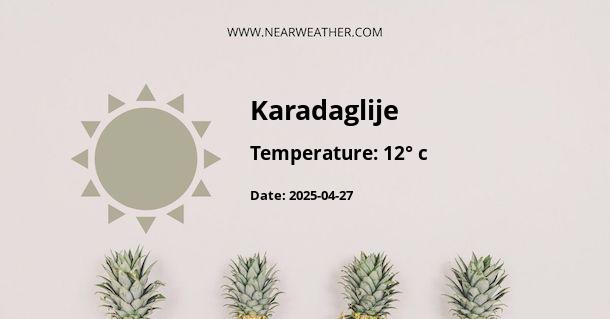Understanding the Climate and Weather Patterns of Karadaglije, Bosnia and Herzegovina
Karadaglije is a locale within the heart of the Balkans, specifically within Bosnia and Herzegovina—a country renowned for its natural landscapes, diverse climate, and historical richness. The climate in Karadaglije, as in much of Bosnia and Herzegovina, is characterized by a blend of continental and Mediterranean influences, which result in distinct seasonal variations. Understanding these weather patterns is critical for agriculture, tourism, and daily life in the region.
Seasonal Climate Overview
The climate in Karadaglije is primarily continental, with hot summers, cold winters, and moderate rainfall throughout the year. Here, we break down this climate by seasons:
- Spring: Spring in Karadaglije is typically marked by a gradual warming trend with increasing daylight hours. The temperatures begin to rise from a cool average in March to more moderate temperatures in May. Precipitation during this season is relatively high, which contributes to the lush greenery of the region.
- Summer: Summer months are warm and can occasionally be hot, with temperatures often reaching into the 30s Celsius (upper 80s to mid-90s Fahrenheit). Rainfall tends to be less frequent but can come in the form of intense thunderstorms, which are not uncommon in this inland area.
- Autumn: Autumn brings a noticeable cooling trend, as temperatures drop steadily from September onwards. This season is known for its array of colors as the foliage changes. Rainfall starts to increase again, setting the stage for the wetter winter months.
- Winter: Winters are cold with temperatures often dipping below freezing. Snowfall occurs, although its amount can vary from year to year. Fog and overcast conditions are usual, which can sometimes lead to a phenomenon known as temperature inversion.
Temperature and Precipitation Tables
To exhibit a more detailed overview of the climate in Karadaglije, let's look into the typical temperatures and precipitation levels throughout the year. The following data is presented in a table format to provide clarity and precision.
| Month | Average High (°C) | Average Low (°C) |
|---|---|---|
| January | 3 | -3 |
| February | 6 | -1 |
| March | 10 | 1 |
| April | 15 | 5 |
| May | 21 | 9 |
| June | 24 | 13 |
| July | 27 | 15 |
| August | 27 | 14 |
| September | 23 | 11 |
| October | 17 | 6 |
| November | 10 | 2 |
| December | 5 | -1 |
| Month | Precipitation (mm) |
|---|---|
| January | 52 |
| February | 49 |
| March | 52 |
| April | 61 |
| May | 69 |
| June | 72 |
| July | 74 |
| August | 66 |
| September | 70 |
| October | 72 |
| November | 68 |
| December | 65 |
Note: The provided data are averages and are subject to variations due to cyclic weather changes, specific atmospheric conditions, and shifts in climate patterns.
Weather Extremes and Notable Events
In the region where Karadaglije is situated, weather extremes can occasionally occur, leading to notable events. Examples include:
- Heatwaves: During the summer, particularly in July and August, extreme heatwaves can push temperatures well above the seasonal averages, potentially causing health problems and exacerbating drought conditions.
- Cold Snaps: Conversely, during winter, sharp cold snaps can result in temperatures plunging significantly below the norm, bringing heavy snowfall, ice, and freezing conditions that can have an impact on infrastructure and daily living.
- Flooding: Periods of intense rainfall, especially during spring or autumn, can sometimes lead to flooding in the area. Melting snow and ice can contribute to high water levels in local rivers, affecting towns and rural areas alike.
Climate Change Considerations
As climate change continues to manifest globally, its effects on the meteorological patterns in Karadaglije cannot be ignored. Warming trends could lead to hotter and possibly drier summers with exacerbated heat extremes. Winters could become milder, altering traditional snowfall patterns and impacting sectors like agriculture and tourism. Implementation of sustainable practices and adaptation strategies is critical for the region's resilience against the evolving climate.
Weather's Impact on Lifestyle and Economy
The weather and climate in Karadaglije significantly influence the local lifestyle, culture, and economy. Agriculture relies on the understanding of seasonal weather patterns for crop planning and harvesting. Additionally, activities such as tourism, with its focus on outdoor and historical sites, depend on the predictable weather patterns to attract visitors during peak comfortable seasons.
Lastly, historical architecture and infrastructure must be maintained with careful consideration for the extremes of the local climate, such as reinforcing roofs and drainage systems to withstand heavy snowfall and rainfall. Understanding and preparing for the full range of weather conditions in Karadaglije is essential for the sustainability and growth of the region's diverse and dynamic industries.
A - Karadaglije's Latitude is 44.571671 & Longitude is 18.018330.
A - Weather in Karadaglije is 12° today.
A - Climate Conditions in Karadaglije shows overcast clouds today.
A - Humidity in Karadaglije is 96% today.
A - Wind speed in Karadaglije is 4.36 km/h, flowing at 290° wind direction. today.
